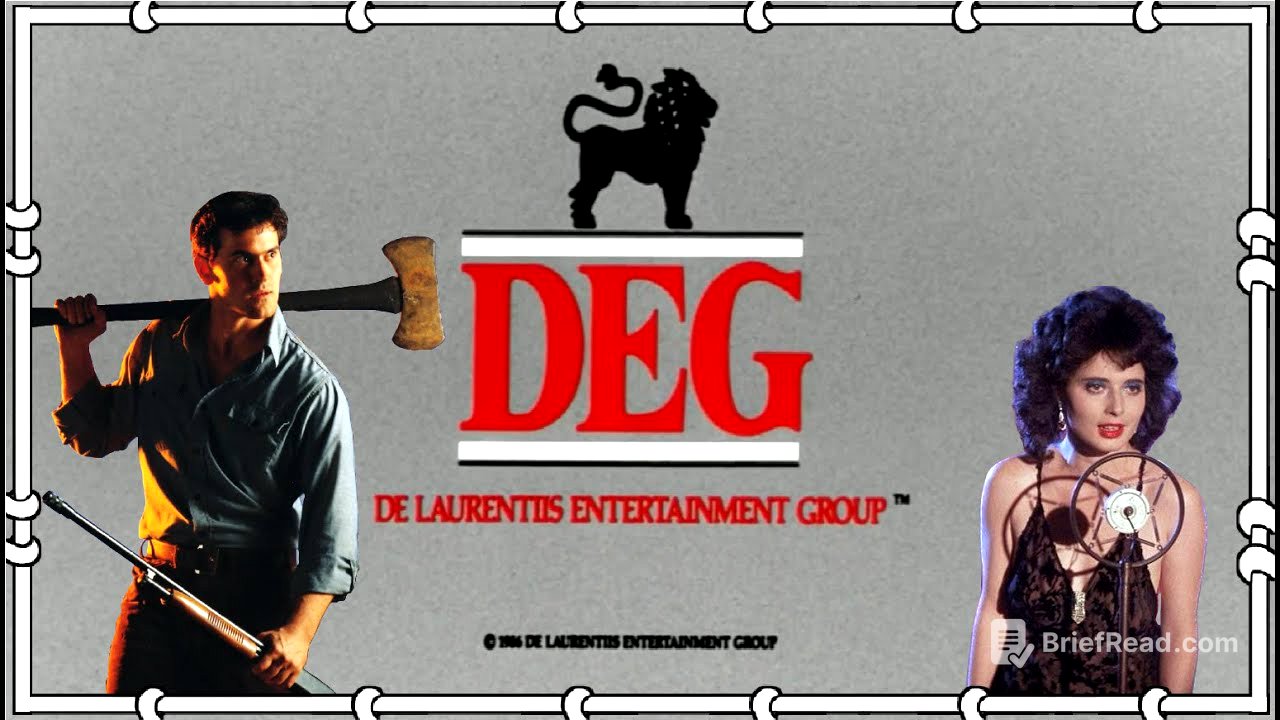TLDR;
This video chronicles the life and career of Dino De Laurentiis, an Italian film producer who made a significant impact on Hollywood. It covers his early success in Italy, his move to America, his attempt to build a major studio, and his eventual comeback with the Hannibal Lecter franchise.
- Dino De Laurentiis was a prolific producer known for both artistic and commercial films.
- He built a major studio complex in Wilmington, North Carolina, but faced financial difficulties.
- Despite setbacks, he achieved significant success with the Hannibal Lecter franchise.
Dino De Laurentiis' Early Life and Career in Italy [1:02]
Dino De Laurentiis was born in Italy in 1919 and studied film before becoming a producer in his early twenties. He was a key figure in Italian neorealism, producing films with directors like Federico Fellini and Roberto Rossellini that gained international recognition. Dino developed a business model of pre-selling international film rights to fund his productions. He expanded into international films with American stars and built his own studio outside Rome in 1962, known as Dinocittà, where he produced lavish films, earning him the nickname "the Cecil B. DeMille of his time."
Move to America and Initial Success [2:21]
In the early 1970s, Dino sold his Italian studio and moved to the United States, forming the Dino De Laurentiis Corporation. He partnered with major studios to distribute his films, focusing on production. His first American production, "Serpico," was a hit, followed by "Death Wish" and "Three Days of the Condor." His biggest success was the 1976 remake of "King Kong," which grossed over $100 million and established him as a major Hollywood producer. Dino balanced artistic films with popular trends, such as "Orca," capitalizing on the success of "Jaws."
Venturing into Blockbusters and Facing Setbacks [3:47]
By 1980, Dino was producing big-budget blockbusters like "Flash Gordon" and financing horror films like "Halloween 2." While some films did well, others like "Hurricane" and "Ragtime" flopped. Despite these failures, Dino continued to produce films, leading to questions about his funding sources, which he denied were connected to organized crime. He was known for his ability to raise money for ambitious projects.
Building a Studio in Wilmington, North Carolina [5:30]
Dino found success again in 1982 with "Conan the Barbarian," starring Arnold Schwarzenegger. In 1983, he produced "The Dead Zone" and began filming "Firestarter" in Wilmington, North Carolina. He decided to build a film studio complex there, attracted by the varied landscapes and right-to-work laws that limited the power of labor unions. Dino invested over $10 million to build ten sound stages and other facilities, estimating it would infuse $50 to $100 million a year into the local economy.
Financial Troubles and the Acquisition of Embassy Pictures [7:27]
In 1984, Dino's company released several films, including "The Bounty," "Firestarter," "Conan the Destroyer," and "Dune." While "Conan the Destroyer" was a modest hit, "Dune" was a critical and commercial failure. By the mid-1980s, Dino's company was struggling. He acquired Embassy Pictures from Coca-Cola in 1985 for $35 million to self-distribute his films, renaming his company De Laurentiis Entertainment Group (DEG).
Going Public and Initial Releases [10:36]
Dino took DEG public in 1986, issuing 1.85 million shares at $12 per share, aiming to raise $500 million. He planned to produce films for $10 million each, selling off television, home video, and international rights to cover costs, and then distribute the films in the US and Canada. The company's stock initially rose, but DEG's first releases, including "Raw Deal," "Maximum Overdrive," and "Manhunter," were disappointments.
Brief Successes and More Failures [13:15]
DEG distributed animated children's movies like "Transformers: The Movie" and "My Little Pony: The Movie," which were not successful. However, David Lynch's "Blue Velvet," which Dino funded, became a cult hit and earned Lynch an Academy Award nomination. Dino announced plans for another studio complex in Australia. DEG's later releases in 1986, including "Tai-Pan," "Crimes of the Heart," and "King Kong Lives," were commercial failures.
Financial Collapse and Bankruptcy [16:17]
Despite the failures, Dino opened a seventh sound stage at the Wilmington studio. In 1987, "Evil Dead 2" was a minor hit, but other releases flopped, including "Million Dollar Mystery," which failed to gross even $1 million. DEG posted massive losses and faced the risk of its film library being taken over by creditors. The financial chaos impacted De Laurentiis Limited and the Gold Coast Studio, halting production on "Total Recall."
Resignation and Final Sale [18:21]
Dino resigned as chairman and CEO of DEG in November, remaining the largest shareholder and returning to independent producing. DEG sold its film library rights and filed for bankruptcy protection in August 1988, having lost $70 million. Films in production were sold off, including "Bill and Ted's Excellent Adventure," which became a hit for Nelson Entertainment and Orion Pictures. In April 1989, Carolco Pictures purchased the bankrupt studio.
Aftermath and New Beginnings [21:27]
Dino blamed the company's failure on his inexperience in the corporate world. He formed a new production company, Dino De Laurentiis Communications, and partnered with Universal. He missed out on distributing hits like "Good Morning, Vietnam" and "Crocodile Dundee."
Legal Battles and the Hannibal Lecter Franchise [22:39]
In 1991, Orion Pictures released "The Silence of the Lambs," based on Thomas Harris's novel featuring Hannibal Lecter, a character from DEG's "Manhunter." Dino had passed on adapting the novel, granting Orion the rights. After "Silence of the Lambs" became a huge hit, Dino sued Universal Studios in 1992, claiming they were blackmailing him into surrendering his rights to the Hannibal character. The lawsuit was eventually settled, and Dino agreed to work with Universal on the sequel.
Success with "Hannibal" and Legacy [25:28]
Dino continued producing films, including "Bound," the directorial debut of the Wachowskis. He pursued the sequel to "The Silence of the Lambs," finally securing the film adaptation rights to Harris's novel "Hannibal" for a record $10 million. Despite mixed reactions to the book and changes in cast and director, the film "Hannibal" was released in 2001 and became the highest-grossing film Dino had ever produced, grossing over $350 million worldwide. In 2001, Dino received the Irving G. Thalberg Memorial Award. Dino passed away in 2010 at the age of 91. His career reflects the changing film industry, from a producer-driven era to a corporate-dominated one.









